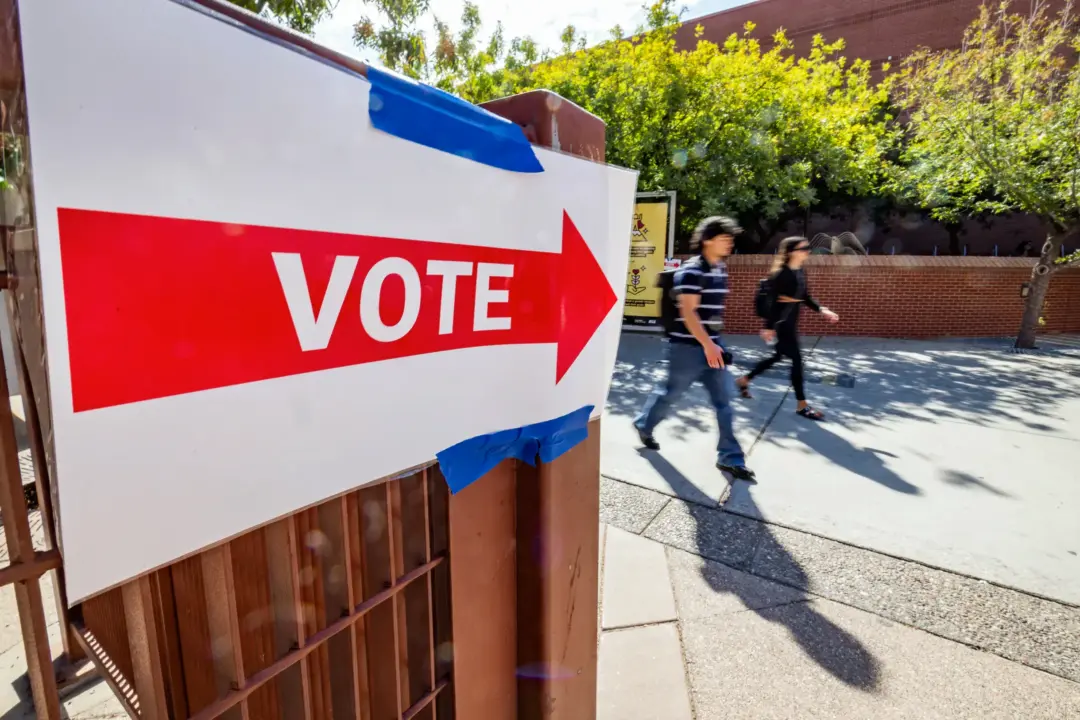The group lacks standing to request citizenship checks, and federal law prohibits voter list maintenance within 90 days of election, the judge ruled.
A federal judge has ruled against an Arizona group’s legal effort to force county officials to investigate ahead of the upcoming general election whether more than 40,000 registered voters are U.S. citizens.
U.S. District Judge Krissa Lanham, in a 22-page order issued on Oct. 11, denied a motion by Strong Communities Foundation of Arizona for a temporary restraining order and preliminary injunction that would have compelled country recorders to immediately verify the citizenship status of individuals registered to vote only in federal elections.
The Strong Communities lawsuit centers on Arizona’s two-tiered voter registration system. Under state law, individuals who provide documented proof of citizenship can vote in all elections. However, the National Voter Registration Act allows those without such proof to register for federal elections by signing an avowal under penalty of perjury.
Currently, about 42,000 voters are registered under this federal-only system. Even though it remains illegal for noncitizens to vote, the lawsuit claims that Arizona county recorders are failing to comply with state laws requiring them to perform “list maintenance” to ensure that voter rolls are free of ineligible voters.
In her order, the judge determined that Strong Communities lacks standing to challenge the alleged failure of county officials to conduct the citizenship checks.
“Plaintiffs’ request raises no more than a ‘generalized grievance’ shared by every Arizona voter that elected officials must follow the law,” the judge wrote.
Lanham also noted that even if the plaintiffs had standing, their request to compel county recorders to submit citizenship verification requests to the Department of Homeland Security (DHS) was too close to the Nov. 5 election to be feasible.
“Plaintiffs waited until shortly before the election to file this lawsuit despite allegedly suffering irreparable harm since Arizona’s 2022 voter list maintenance laws went into effect,” the judge wrote.
Lanham also stated that Strong Communities had failed to show how their proposed relief would address the alleged harm, as federal law prohibits systematic voter list maintenance within 90 days of a federal election.
“The court declines to order Arizona’s county recorders to divert resources from preparing for the general election to instead submitting thousands of requests to DHS when plaintiffs have not shown clearcut injury, particularly when the relief they originally requested … is currently precluded by the National Voter Act quiet period,” she wrote.
In its Sept. 30 lawsuit, Strong Communities argued that failing to verify citizenship could lead to vote dilution and undermine election integrity. The plaintiffs cited concerns from Arizona voters and surveys indicating lack of trust in election officials’ efforts to prevent noncitizens from voting.
“They have failed to take the actions required by law to ensure that foreign citizens are removed from voter rolls,” the plaintiffs alleged. “These failures cause voters to lose confidence in the integrity of our election system. For example, a recent national survey of likely voters found that 52 [percent] believe election officials are either doing nothing to prevent foreign citizens from voting or are not doing enough.”
The plaintiffs argued that their lawsuit seeks to restore public trust in Arizona’s electoral system by ensuring that voter list maintenance required by both law and “common sense” is carried out.
In response to the plaintiffs’ motion, Maricopa County Recorder Stephen Richer, who was named as a defendant in the lawsuit, argued that Strong Communities’ demands are based on unfounded assumptions that the 42,000 federal-only voters are noncitizens attempting to commit voter fraud. Richer argued that the state’s current verification efforts are adequate under law and noted that a recent Arizona Supreme Court ruling rejected the idea that a lack of documentation implies noncitizenship.
Merissa Hamilton of Strong Communities told The Epoch Times in an emailed statement that the group’s attorneys are evaluating the ruling.

